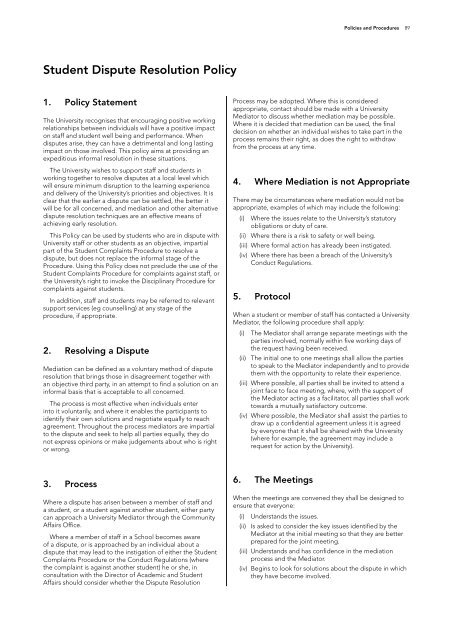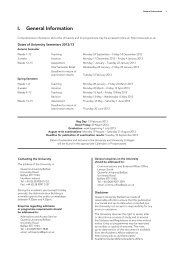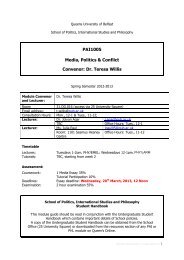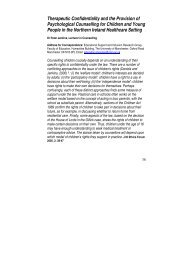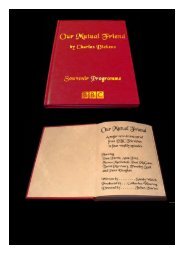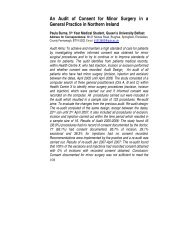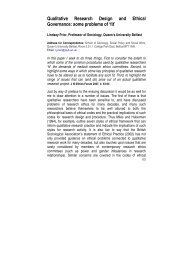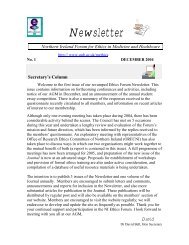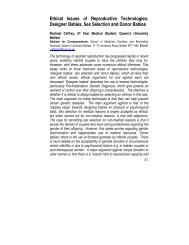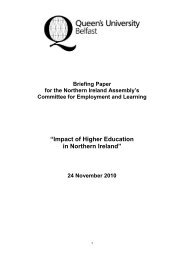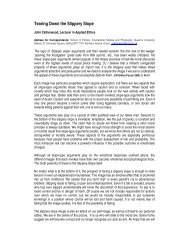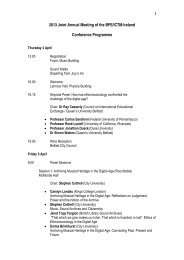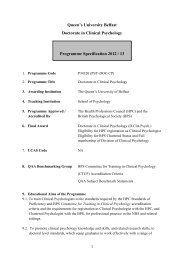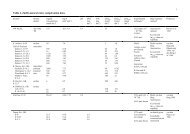University Calendar for Postgraduate Students 2012/13 - Queen's ...
University Calendar for Postgraduate Students 2012/13 - Queen's ...
University Calendar for Postgraduate Students 2012/13 - Queen's ...
Create successful ePaper yourself
Turn your PDF publications into a flip-book with our unique Google optimized e-Paper software.
Policies and Procedures 89<br />
Student Dispute Resolution Policy<br />
1. Policy Statement<br />
The <strong>University</strong> recognises that encouraging positive working<br />
relationships between individuals will have a positive impact<br />
on staff and student well being and per<strong>for</strong>mance. When<br />
disputes arise, they can have a detrimental and long lasting<br />
impact on those involved. This policy aims at providing an<br />
expeditious in<strong>for</strong>mal resolution in these situations.<br />
The <strong>University</strong> wishes to support staff and students in<br />
working together to resolve disputes at a local level which<br />
will ensure minimum disruption to the learning experience<br />
and delivery of the <strong>University</strong>’s priorities and objectives. It is<br />
clear that the earlier a dispute can be settled, the better it<br />
will be <strong>for</strong> all concerned, and mediation and other alternative<br />
dispute resolution techniques are an effective means of<br />
achieving early resolution.<br />
This Policy can be used by students who are in dispute with<br />
<strong>University</strong> staff or other students as an objective, impartial<br />
part of the Student Complaints Procedure to resolve a<br />
dispute, but does not replace the in<strong>for</strong>mal stage of the<br />
Procedure. Using this Policy does not preclude the use of the<br />
Student Complaints Procedure <strong>for</strong> complaints against staff, or<br />
the <strong>University</strong>’s right to invoke the Disciplinary Procedure <strong>for</strong><br />
complaints against students.<br />
In addition, staff and students may be referred to relevant<br />
support services (eg counselling) at any stage of the<br />
procedure, if appropriate.<br />
2. Resolving a Dispute<br />
Mediation can be defined as a voluntary method of dispute<br />
resolution that brings those in disagreement together with<br />
an objective third party, in an attempt to find a solution on an<br />
in<strong>for</strong>mal basis that is acceptable to all concerned.<br />
The process is most effective when individuals enter<br />
into it voluntarily, and where it enables the participants to<br />
identify their own solutions and negotiate equally to reach<br />
agreement. Throughout the process mediators are impartial<br />
to the dispute and seek to help all parties equally, they do<br />
not express opinions or make judgements about who is right<br />
or wrong.<br />
Process may be adopted. Where this is considered<br />
appropriate, contact should be made with a <strong>University</strong><br />
Mediator to discuss whether mediation may be possible.<br />
Where it is decided that mediation can be used, the final<br />
decision on whether an individual wishes to take part in the<br />
process remains their right, as does the right to withdraw<br />
from the process at any time.<br />
4. Where Mediation is not Appropriate<br />
There may be circumstances where mediation would not be<br />
appropriate, examples of which may include the following:<br />
(i) Where the issues relate to the <strong>University</strong>’s statutory<br />
obligations or duty of care.<br />
(ii) Where there is a risk to safety or well being.<br />
(iii) Where <strong>for</strong>mal action has already been instigated.<br />
(iv) Where there has been a breach of the <strong>University</strong>’s<br />
Conduct Regulations.<br />
5. Protocol<br />
When a student or member of staff has contacted a <strong>University</strong><br />
Mediator, the following procedure shall apply:<br />
(i) The Mediator shall arrange separate meetings with the<br />
parties involved, normally within five working days of<br />
the request having been received.<br />
(ii) The initial one to one meetings shall allow the parties<br />
to speak to the Mediator independently and to provide<br />
them with the opportunity to relate their experience.<br />
(iii) Where possible, all parties shall be invited to attend a<br />
joint face to face meeting, where, with the support of<br />
the Mediator acting as a facilitator, all parties shall work<br />
towards a mutually satisfactory outcome.<br />
(iv) Where possible, the Mediator shall assist the parties to<br />
draw up a confidential agreement unless it is agreed<br />
by everyone that it shall be shared with the <strong>University</strong><br />
(where <strong>for</strong> example, the agreement may include a<br />
request <strong>for</strong> action by the <strong>University</strong>).<br />
3. Process<br />
Where a dispute has arisen between a member of staff and<br />
a student, or a student against another student, either party<br />
can approach a <strong>University</strong> Mediator through the Community<br />
Affairs Office.<br />
Where a member of staff in a School becomes aware<br />
of a dispute, or is approached by an individual about a<br />
dispute that may lead to the instigation of either the Student<br />
Complaints Procedure or the Conduct Regulations (where<br />
the complaint is against another student) he or she, in<br />
consultation with the Director of Academic and Student<br />
Affairs should consider whether the Dispute Resolution<br />
6. The Meetings<br />
When the meetings are convened they shall be designed to<br />
ensure that everyone:<br />
(i) Understands the issues.<br />
(ii) Is asked to consider the key issues identified by the<br />
Mediator at the initial meeting so that they are better<br />
prepared <strong>for</strong> the joint meeting.<br />
(iii) Understands and has confidence in the mediation<br />
process and the Mediator.<br />
(iv) Begins to look <strong>for</strong> solutions about the dispute in which<br />
they have become involved.


